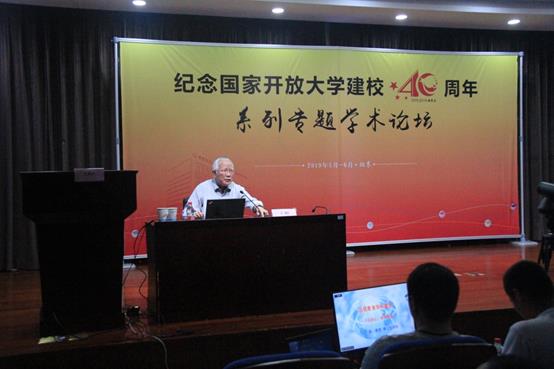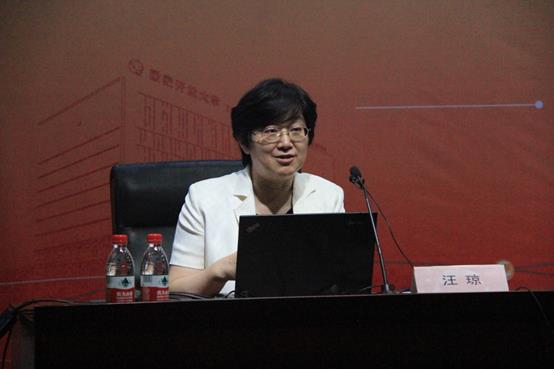 2019 marks the 40th anniversary of the founding of the Open University of China (OUC). As an important part of the celebrations, a series of academic seminars celebrating the 40th anniversary of the founding of the OUC jointly organised by the General Office of Party and Administration and the Education Research Institute have been successfully carried out.
2019 marks the 40th anniversary of the founding of the Open University of China (OUC). As an important part of the celebrations, a series of academic seminars celebrating the 40th anniversary of the founding of the OUC jointly organised by the General Office of Party and Administration and the Education Research Institute have been successfully carried out.
The series of academic seminars were themed around “Education Policy and Reform” and “The Development of Open and Distance Education.” Bringing together macro and micro factors, and domestic and overseas influences, the OUC invited well-known experts and scholars from influential universities and national research institutes to give lectures, aiming to enliven the academic and cultural atmosphere, and broaden the academic visions of the teaching faculty and staff in order to inspire them to further promote the construction of the OUC from the perspective of the development of the education cause.
The first academic seminar was held on 21 May. The lecturer was Professor Yuan Fujie from the Open University of Japan (OUJ). In her report titled The Construction of Japan's Lifelong Education System: The Latest Policy Interpretation and Practice, she gave an in-depth introduction to the formulation process, contents, and influence of the latest policy formulated since 2016 in science, technology, and education against the background of Japan's ageing population and declining birthrate. She gave a comprehensive introduction to the education practices carried out by the OUJ, including student career and age characteristics, student learner support, MOOCs, TV courses, and the construction and use of the face-to-face courses. Her report is of great value to the teaching practice and reform of OUC degree education, non-degree education for older adults, and community education development.

The second academic seminar was held on 28 May. The lecturer was Professor Ding Xin from South China Normal University. In his report entitled The Construction of the Distance Education Discipline, he gave a basic introduction to discipline construction and started the discussion by raising the question of whether distance education is a discipline, comprehensively establishing the concept of distance education, the theory of distance education, and the relationship between distance education theory and practice. He clearly stated that under the influence of differentiation and integration, distance education is being separated from the rest of education science. It is developing into a new, relatively independent type of education and discipline system that is developing in parallel with traditional school education. Professor Ding further analysed the necessary yet sufficient conditions, as well as the opportunities for the construction of distance education discipline. He put forward that "in order to establish this discipline as soon as possible, we must make great efforts and establish a reasonable scientific distance education theory system.” His report pointed out a research and development direction for the construction of the distance education discipline, in particular, the construction of the distance education theory system.

The third academic seminar was held on 4 June. The lecturer was Professor Wang Qiong, director of the Digital Learning Research Centre of Peking University and the Education School of Peking University. She gave a report entitled Learning Analysis in Distance and Open Education. In her report, she introduced concepts related to learning analysis and then explained its relationship with open and distance education. She introduced the goals and methods of learning analysis. Then, using the MOOC course set up by her team as an example, she demonstrated the use of learning analysis in promoting teaching improvement. Her lecture incorporated the latest research progress on learning analysis at home and abroad. She cited cases to verify the theories and research, which aroused great interest from teachers in the Teaching Department, Education Research Institute, Information Technology Department, and Learner Support Department.

Over the next two weeks, three more academic seminars will be held. The lecturers and topics are as follows: Professor Liu Baocun from Beijing Normal University, The Internationalisation of Higher Education: Connotations, Measures, and Challenges; Han Min, executive vice chairman of the Chinese Society of Educational Development Strategy, Education Modernisation and Open Universities: Looking Back and Looking Forward; Senior Professor Ken Spours from University College London (UCL), The Fourth Industrial Revolution and Artificial Intelligence: Future Work and Lifelong Learning.
The launch of the series of academic seminars aims to effectively lead the teaching faculty and staff of the OUC in thinking in depth about the reform, innovation, and development of open universities in the process of building a lifelong education system. The seminars have pointed out the direction of the future practical and theoretical development of open universities.
By Li Ying, OUC